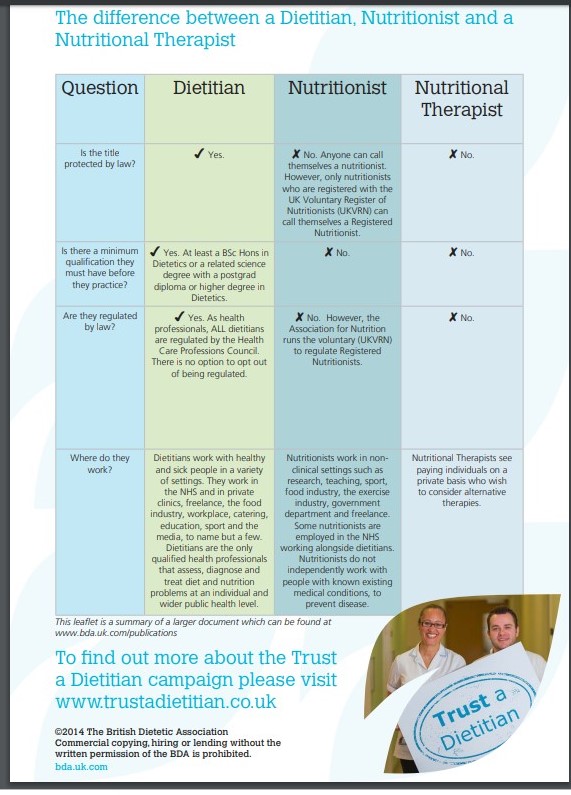Why See A Dietitian?
Dietitians are the only qualified health professionals that assess, diagnose and treat dietary and nutritional problems at an individual and wider public health level. Dietitians use the most up to-date public health and scientific research on food, health and disease, which they translate into practical guidance to enable people to make appropriate lifestyle choices.
Is the title ‘Dietitian’ protected by law?
YES. Only those registered with the statutory regulator, the Health & Care Professions Council (HCPC) can use the title.
How can I check that my dietitian is registered? By checking the HCPC online register www.hcpc-uk.org
What qualifications do Dietitians have?
The minimum requirement is a BSc Hons in Dietetics, or a related science degree with a postgraduate diploma or higher degree in Dietetics.
The British Dietetic Association (BDA) is the professional body and Trade Union and is also responsible for designing the curriculum for the profession. Courses must be approved by the HCPC and demonstrate that graduates meet the Standards of Proficiency for Dietetics.
What is the difference between a Dietitian and a Nutritionist?
Nutritionists are not required to be registered in order to work in the UK.
Is the title ‘Nutritionist ‘protected by law?
No – anyone can call themselves a nutritionist, however only registrants with the UK Voluntary Register of Nutritionists (UKVRN) can call themselves a Registered Nutritionist (RNutrs). RNutrs are not permitted by law to call themselves dietitians.What is the difference between a Dietitian and a Nutritional Therapist?
Similarly to ‘Nutritionists’, ‘Nutritional Therapists’ are not currently regulated by law within the UK.
*See Table below for a summary of the differences, provided by the British Dietetics Association.

Reasons to see ‘Your Health Dietitian’:
NB: if you have been diagnosed or suspect you may have one of the medical conditions starred above (*), you should consult your GP for advice, diagnosis and treatment. Always inform them before starting an alternative or additional therapies, or making any major changes to your treatment plan.

